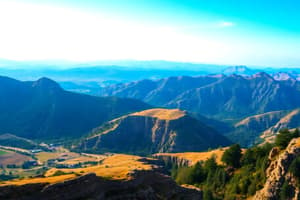Podcast
Questions and Answers
What branch of geography primarily focuses on human activities and cultures?
What branch of geography primarily focuses on human activities and cultures?
- Geospatial Technology
- Physical Geography
- Human Geography (correct)
- Climatology
Which geographic theme refers to the characteristics that define a specific location?
Which geographic theme refers to the characteristics that define a specific location?
- Place (correct)
- Region
- Movement
- Location
What is the significance of biodiversity in ecosystems?
What is the significance of biodiversity in ecosystems?
- It affects the climate patterns.
- It is crucial for ecosystem health. (correct)
- It primarily influences human migration.
- It reduces the need for urbanization.
Which tool is NOT considered a part of Geospatial Technology?
Which tool is NOT considered a part of Geospatial Technology?
What type of climate zone is characterized by extreme temperature variations and limited precipitation?
What type of climate zone is characterized by extreme temperature variations and limited precipitation?
Which term describes areas defined by certain cultural, economic, or physical characteristics?
Which term describes areas defined by certain cultural, economic, or physical characteristics?
What is the process of population shifting from rural to urban areas called?
What is the process of population shifting from rural to urban areas called?
Which statement best defines the concept of sustainability?
Which statement best defines the concept of sustainability?
Flashcards are hidden until you start studying
Study Notes
Key Concepts in Geography
-
Definition: Geography is the study of the Earth's landscapes, environments, and the relationships between people and their environments.
-
Branches:
- Physical Geography: Examines natural processes and features (landforms, climate, vegetation).
- Human Geography: Focuses on human activities, cultures, economies, and their relationship with the environment.
- Geospatial Technology: Involves tools like GIS (Geographic Information Systems), GPS (Global Positioning System), and remote sensing.
-
Key Themes:
- Location: The position of something on the Earth's surface (absolute vs. relative).
- Place: The physical and human characteristics that define a location.
- Region: Areas defined by certain unifying characteristics (cultural, economic, physical).
- Human-Environment Interaction: How humans adapt to and modify their environment.
- Movement: The diffusion of people, goods, and ideas across space.
Important Concepts
-
Latitude and Longitude:
- Latitude: Measures north-south position (0° at the Equator).
- Longitude: Measures east-west position (0° at the Prime Meridian).
-
Maps and Scale:
- Types of maps (topographic, political, thematic).
- Scale represents the relationship between distance on a map and actual distance on the ground.
-
Climate Zones:
- Tropical, arid, temperate, polar, and highland zones.
- Influences weather patterns, ecosystems, and human activities.
-
Landforms:
- Types include mountains, valleys, plateaus, hills, and plains.
- Formed by geological processes (erosion, tectonics).
Major Geographic Concepts
-
Biodiversity: The variety of life in different ecosystems; crucial for ecosystem health.
-
Urbanization: The process of population shifting from rural to urban areas, affecting land use and resources.
-
Sustainability: Meeting present needs without compromising future generations' ability to meet their own.
-
Cultural Landscapes: The visible imprint of human activity on the landscape, reflecting cultural values and practices.
Current Trends in Geography
-
Globalization: Increased interconnectedness of economies and cultures, often facilitated by technology.
-
Climate Change: Impacting physical geography, natural disasters, and human settlement patterns.
-
Urban Planning: Focus on sustainable development and management of urban growth.
-
Environmental Geography: Study of interactions between humans and the environment, including conservation efforts.
Key Concepts in Geography
- Geography explores Earth's landscapes, environments, and human-environment relationships.
- Branches of Geography:
- Physical Geography: Studies natural processes and features including landforms, climate, and vegetation.
- Human Geography: Investigates human activities, cultures, economies, and their interactions with the environment.
- Geospatial Technology: Utilizes tools like GIS, GPS, and remote sensing for spatial analysis and mapping.
- Key Themes:
- Location: Refers to the position on Earth's surface; can be absolute (specific coordinates) or relative (in relation to other locations).
- Place: Encompasses the physical and human characteristics that define specific locations.
- Region: Defined areas based on common characteristics, such as cultural, economic, or physical attributes.
- Human-Environment Interaction: Studies how humans adapt to and alter their environments.
- Movement: Examines the spread of people, goods, and ideas across different spaces.
Important Concepts
- Latitude and Longitude:
- Latitude: Measures north-south position, with 0° at the Equator.
- Longitude: Measures east-west position, with 0° at the Prime Meridian.
- Maps and Scale:
- Diverse map types include topographic, political, and thematic maps.
- Scale indicates the relationship between map distances and actual ground distances.
- Climate Zones:
- Main zones include tropical, arid, temperate, polar, and highland.
- Each zone influences weather patterns, ecosystems, and human activities.
- Landforms:
- Types include mountains, valleys, plateaus, hills, and plains.
- Formed through geological processes such as erosion and tectonic activity.
Major Geographic Concepts
- Biodiversity: Refers to the variety of life forms in ecosystems; vital for ecosystem stability.
- Urbanization: Describes the trend of population movement from rural to urban areas, impacting land use and resources.
- Sustainability: Focuses on fulfilling present needs without hindering future generations' potential to meet their own needs.
- Cultural Landscapes: Represent the visible effects of human culture on the environment, reflecting societal values and practices.
Current Trends in Geography
- Globalization: Reflects the growing interconnectedness of economies and cultures, largely driven by technological advancements.
- Climate Change: Alters physical geography and influences natural disaster patterns and human settlement.
- Urban Planning: Emphasizes sustainable development and effective management of urban expansions.
- Environmental Geography: Investigates human-environment interactions, particularly regarding conservation efforts and environmental protection.
Studying That Suits You
Use AI to generate personalized quizzes and flashcards to suit your learning preferences.




